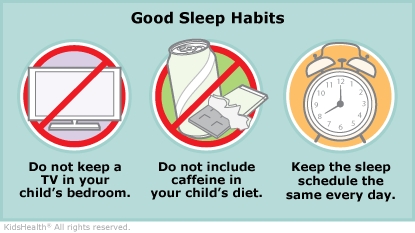Helping Your Teen Sleep Well
Setting regular bedtimes and wake-up times and encouraging good sleep habits can help your teen get the sleep they need.


-
Talk to your teen about setting regular bedtimes and wake-up times so they can get enough sleep:
-
Encourage your teen to wake up and go to bed at about the same time each day.
-
On weekends, teens should try to stick to their sleep schedule as close as they can. Going to bed much later and sleeping in on weekends can make it harder to sleep well during the week.
-
Help make the bedroom quiet and restful. Don't keep a TV or video game system there.
-
About an hour before bedtime, have your teen put away homework and turn off the TV, computers, and handheld devices. Consider turning off cellphones or charging them outside the room.
-
Encourage your teen to do something relaxing, like taking a warm bath or reading before going to sleep.
-
Help your teen limit caffeine (found in coffee, tea, soda, energy drinks, and chocolate), especially in the late afternoon and evening.
-
Do not give your teen sleeping pills or other sleep aids unless your health care professional says it is OK.
-
Teens who are very tired during the day can take a short nap (less than an hour) in the early afternoon. Longer or later naps make it harder to fall asleep at night.
-
Encourage your teen to exercise regularly. This can help them sleep better.


How much sleep does my child need? Teens need 8–10 hours of sleep each night, but most teens get much less. It's hard for many teens to fall asleep early because their internal sleep clock shifts to a later bedtime during the teen years. Using technology like smartphones, computers, and TV before bed can make falling asleep even harder.
What problems can happen if my teen doesn't get enough sleep? Not getting enough sleep can cause problems paying attention in school or at work. It also can affect driving — teens who don't get enough sleep are more likely to be in car accidents. Teens who don't get enough sleep don't do as well in school or sports. They may feel moody, depressed, or have other emotional problems.